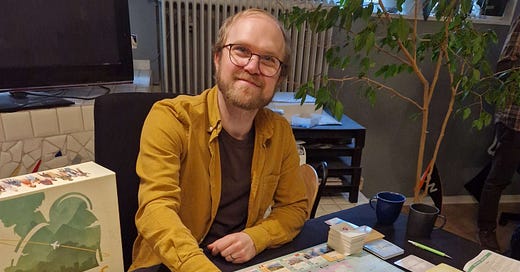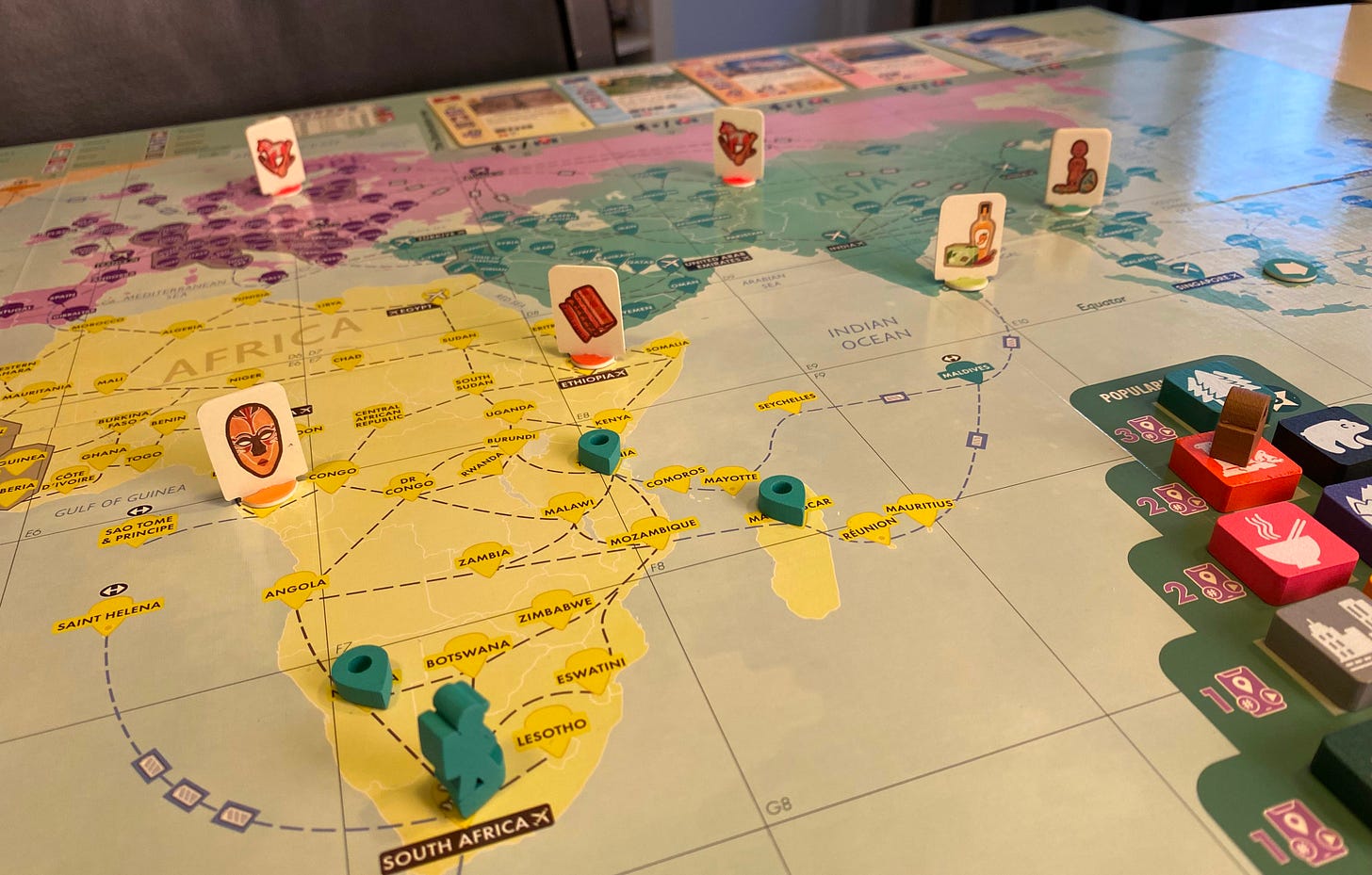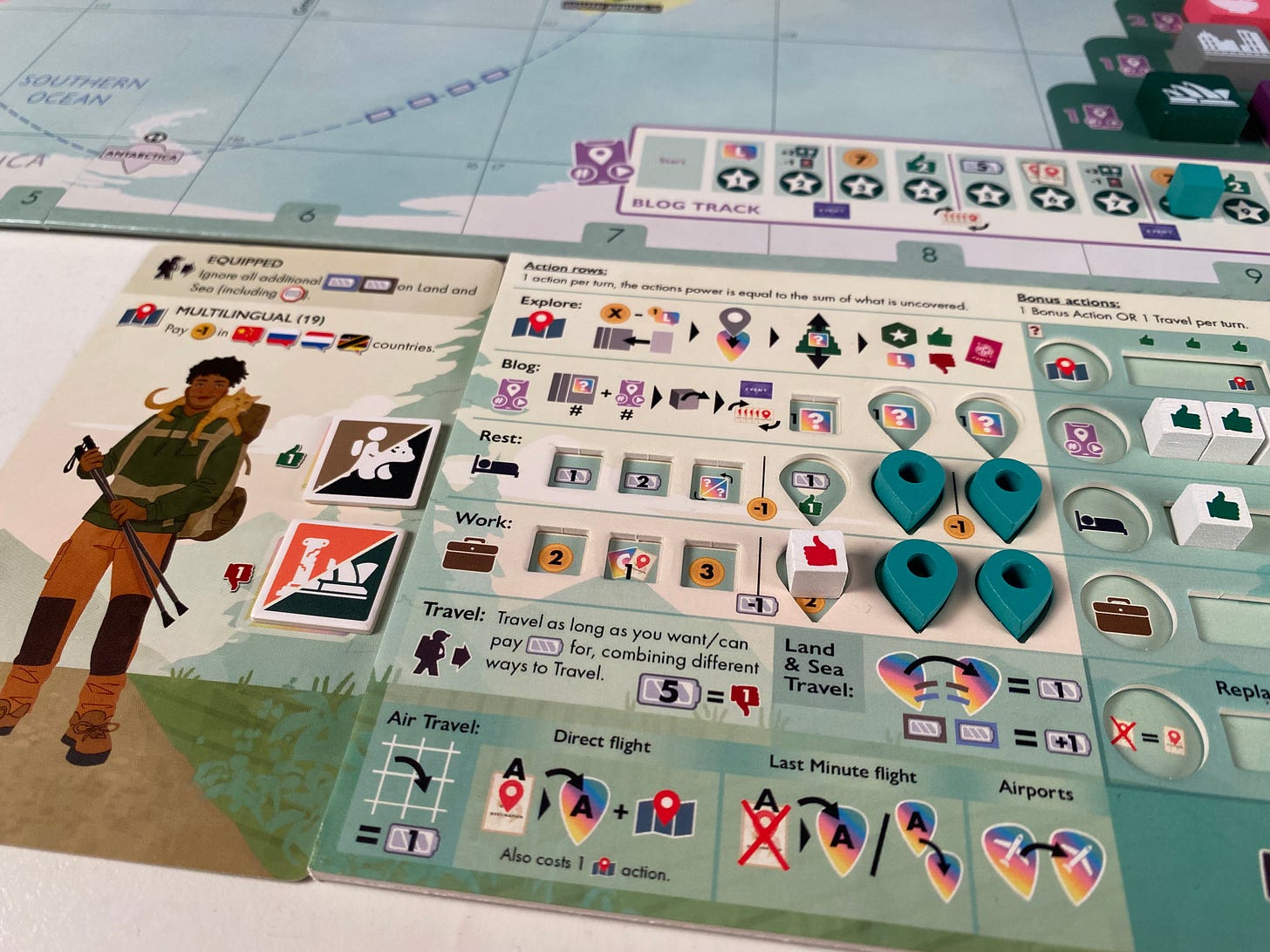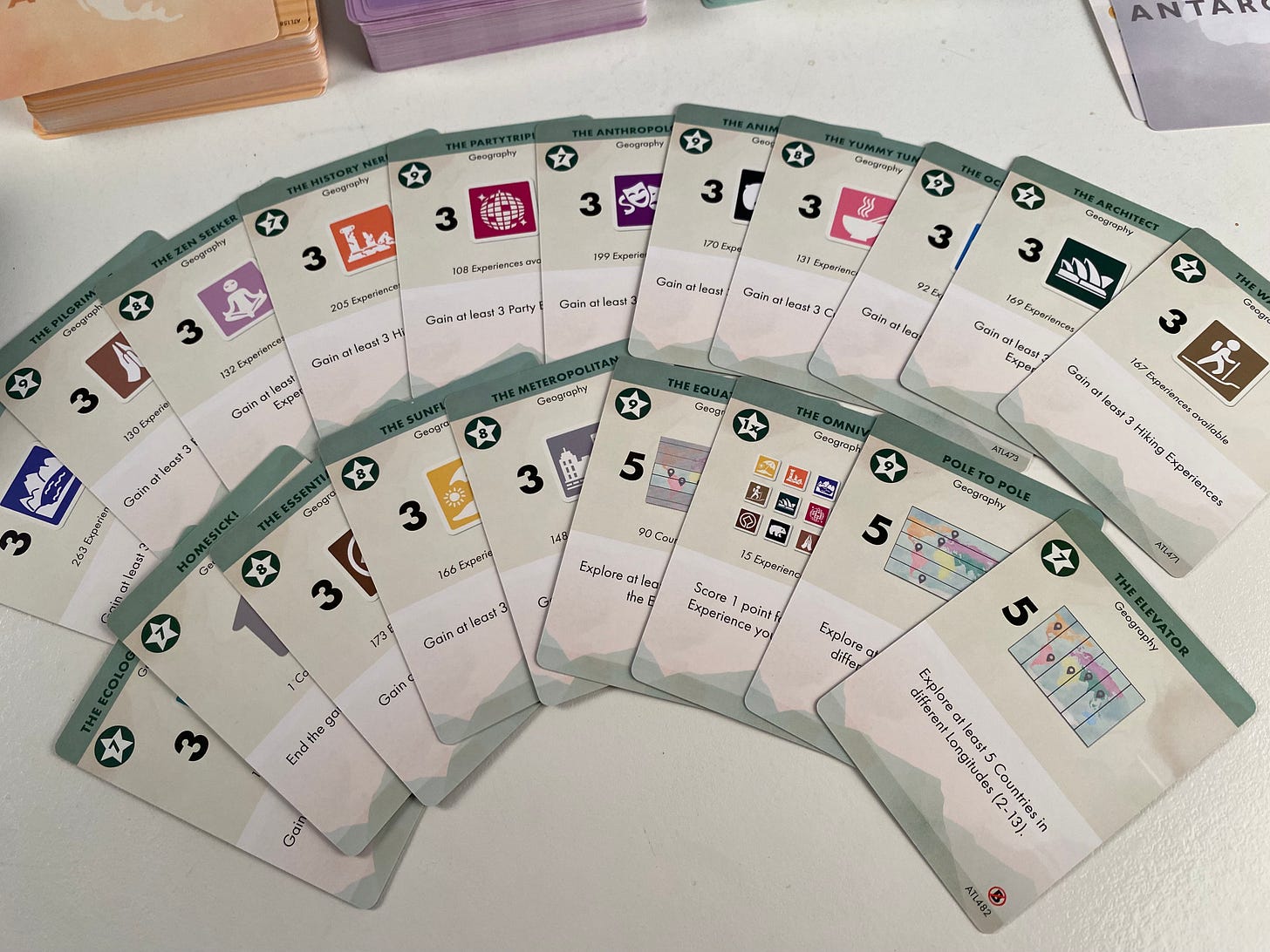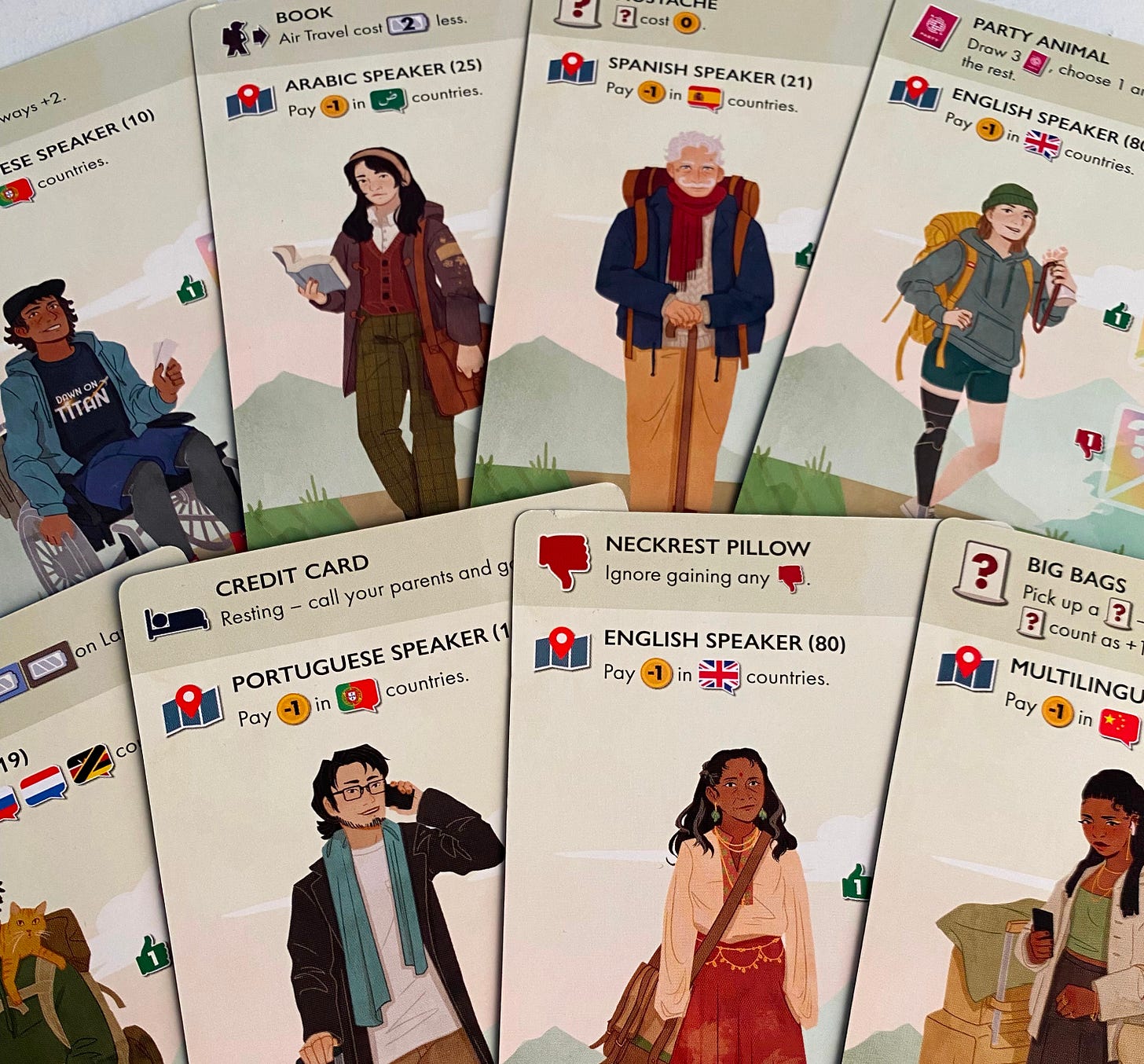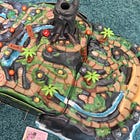Atlas: Explore the World: 'I was missing a game that captured the whole experience of travelling'
Designer Robin Spathon Ek on his globetrotting board game that lets players experience the world from their tabletop
Travelling: Oh, what fun. The adventure. The wanderlust.
Culture, the beach, the partying. And making a new special friend at 2am on the dancefloor of a sweaty Iberian nightclub.
But what if you then have to avoid your new-found chum for the next week when you come back to their holiday let and discover their room is covered with posters of Nicolas Cage, including a life-sized cardboard cutout of the man himself. That they’ve brought with them from Blackburn. In front of which they then re-enact the bees scene from Cage’s adaptation of The Wicker Man.
What then, eh?
Hm, maybe there are downsides. After all, there’s customs. Noisy airport terminals. Strapping yourself into a large metal canister with wings that’s carrying 12,000 gallons of fuel, and being flung across the Atlantic Ocean for the next eight hours of your life.
Perhaps the happy medium is experiencing the world from the safety of your own tabletop. Thanks then, to Swedish designer Robin Spathon Ek, of Ion Game Design, whose Atlas: Explore the World has just been successfully crowdfunded on Kickstarter.
Not only do you discover details about the world’s countries in the game, which might provide some inspiration for real-world travels, but your character also has their own likes and dislikes about where to journey, tailoring their own individual experiences in order to win the game.
We spoke to Robin about the game and his own travel inspirations.
What can you tell us about Atlas: Explore the World, its mechanisms, theme and complexity?
RSE: Atlas is a travel game for gamers who love to travel and for people who like to learn while they play.
If you like geography, if you like flags, if you like well-designed and innovative game mechanics and if you like rich, replayable-friendly content, Atlas will be a real treat. Use your knowledge and learn new things – the whole world in a box.
At its core it is a tableau and set-collection game where you move your backpacker meeple around on the map to one of the 235 countries in the game and play cards matching the country you are currently in, placing the card in front of you in your tableau.
The cards have some experience icons on them (all based on what it is in real life). These icons are the most important aspect of the game and what you want to collect wisely during the game.
The players will compete against each other to determine the points each of these experiences will reward at the end. They do this by pushing up and down experience tokens in a popularity pyramid. It is quite a unique mechanic that I haven’t seen anywhere before.
The players have asymmetrical player boards and characters with special abilities and they are fluent in one or more languages. The characters also have a personality at the start of the game where they like and dislike certain experiences. If a player has gathered three likes, they can discard them to do a bonus action. If they instead gain dislikes, it will make the player temporarily fatigue (making an action a bit weaker).
Players can also collect souvenirs from around the world to reward bonus actions and points.
Included in the game there is also a quick-game variant where you can play a fast, simplified version, when time is limited or to introduce the game to non-gamers.
Each player must achieve their own personal goals to win. How do they go about this?
RSE: The players start with two personal goals, one about flags and one about something else, like gaining three of a specific experience or exploring certain parts of the map.
So if I have a personal goal saying “explore three countries with star(s) in its flag” and my second goal says “gain three city experiences”, I can use my knowledge of the world since all the countries in the world are in the game and you can visit any of them. I need to think, '“stars in flags and big cities oh, maybe Malaysia, China, Australia etc”.
I should also mention that there are public goals that are first-come, first-served about flag colours, being in certain continents and so on.
Every exploration in the game and which country that is explored is an important decision for completing goals. After a player has explored eight countries, the game is over.
How much research went into delving into the facts and stats for each country, and deciding which to choose?
RSE: Oh wow, yeah, the time I have spent researching this is so much I can’t even guess. There are 865 destinations in the game. And actually, information text for each country as well – so in total, over 1,000 text snippets with efficiently worded information. And unique and accurate images to all destinations.
I started around four years ago when I was on parental leave, just trying out the first fast iterations of the gameplay, just trying out if this was even possible. When I had the foundations set, I started to research during the summer and autumn to get each country into the game and what experiences they would give.
But I didn’t write all the fluff on the cards just yet, since I know things always change when making board games. I waited almost three years before doing that. I also got help from Interns in the ION office to speed up the process – that was very helpful.
The research that was the most challenging was the categorisation of the flags and the souvenirs, and which to include and where they would start. I needed to take into account many more balancing aspects in the game.
What did you learn through the Kickstarter campaign? Any particularly useful feedback?
RSE: Not a new knowledge really but still, the most apparent example yet: Kickstarter is a very unpredictable beast! But we are aware of that and have parallel plans for how the game will be made for different scenarios of Kickstarter success.
I am happy it is funded. It started to take off more towards the end, but I was surprised that it had such a slow start and didn’t get more backers.
Atlas is probably the most developed game ION has put up on Kickstarter, ION has a larger customer base now than ever. We had more and nicer prototypes made than ever and the preparations before the Kickstarter were on par with what we normally do. So it is hard to say.
Kickstarter is a lot about timing. Also, Kickstarter does not have the same momentum now as a couple of years back. Today, there are several strong competitors and they probably share customers for the most part. The crowdfunding market is more flooded with games with larger companies entering it one by one (Asmodee being the latest one to start using Kickstarter) and many new upstarts appear every year. These are things we cannot affect.
If we look at things we can enhance, I think we could have been clearer on what type of complexity Atlas has. More videos or GIFs of the gameplay would also have been good, with more influencers’ videos in place at campaign start. The preview page could have been up earlier and had more content.
And I think that we might have to be more active in various social media channels, all at the company, to attract momentum rather than relying on it being at Kickstarter, ready to have an effect on the content we place there.
What impact has the US import tariff situation had on the campaign?
RSE: This is of course hard to know, but in general I think the situation of the world today is not as stable as we have gotten used to. I think we were pretty clear to the backers that they didn’t need to worry about it, that we at ION would cover these costs.
I also think Kickstarter has lost its appeal a bit – from what I hear, people don’t back as much anymore and most of the successful ones are the big box miniature games.
What formed your own interest in geography and travelling? And what compelled you to make this game?
RSE: I have always loved geography since I was a kid, sitting with an atlas at my grandmother's place and dreaming away.
I have a bachelor’s degree in geography from Stockholm University. I have also been backpacking in many countries around Europe, South America and South East Asia.
I was missing a game that captured the whole experience of travelling. Most games with travel themes are too simplified and have too few destinations. Therefore you probably know most of them and you are not learning new things about the world.
The initial thought was: Can you make a game that includes all the countries in the world and still make it into an interactive, tight, educational and fun gaming experience? Even though it was an ambitious project that required a lot of hours and effort, the answer was yes.
During my travels we also brought and played a lot of smaller portable games. This also made me do a portable card game Atlas: Backpacker Edition that was also part of the Kickstarter and is being developed at the same time.
Each globe-trotting character in Atlas has their own likes and dislikes, and needs. What would be on your own character card?
RSE: Great question, I do think the younger me would have said beach and party experiences. But right now I would say both nature and cities. I do really enjoy both and both have their charm.
I think my special ability would be something about not losing as much energy when I travel, since I seem to be less tired from it than my co-travellers.
Where has been your own favourite destination you've been to, and the place you've yet to get to but want to?
RSE: Hard to decide. I think Bolivia, Laos and Slovenia are my favourites. I do want to go to Iceland and Costa Rica pretty badly. I hope this dream will come true soon.
What environmental sustainability measures have been taken with the game?
RSE: Glad you asked! I have worked hard to get rid of any plastic in the game. We have made nice storage boxes and a card holder all in cardboard/paper instead of ziplocks. This also has the benefit of having nice art on them.
The only thing in the box that is plastic is the clips for the player board wheels... to be continued.
Do you have any favourite board games you and family members enjoy playing together?
RSE: Yes, we really enjoy Ark Nova, Everdell, Vendel to Viking, Patchwork and many more.
When do you plan for the game to be in backers' homes and potentially in stores?
RSE: The current plan is to have the game reach the backers before Essen Spiel 2026, and be purchasable in Essen and at retailers after that. Let’s hope that things go as planned.
For more information on Atlas: Explore the World, visit iongamedesign.com
Waddle Waddle: You are the (penguin) hero!
Nature photographer turned creator Darren Humphrey on the Gamefound campaign for his Antarctica-set board game.
Family game reviews (from the perspective of a bewildered father and over-excited child)
Share The Generations Games? Ah, go on…
if you made it this far, you’re probably keen on family tabletop games, and games with a strong social theme. Forwarding to a like-minded friend can make a huge difference to the future of The Generations Games and our hopes to expand our output.

